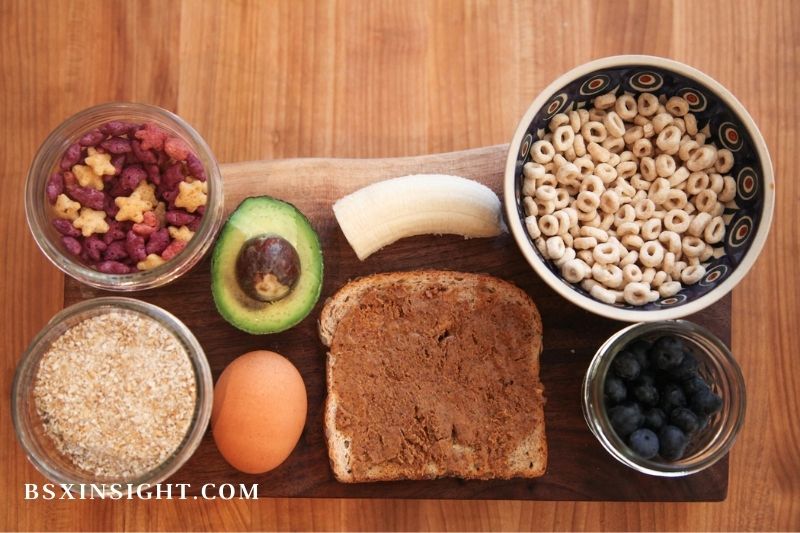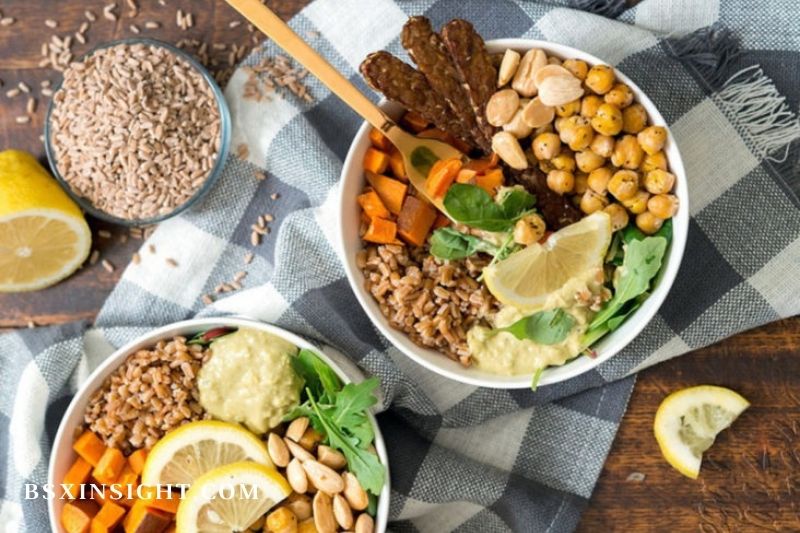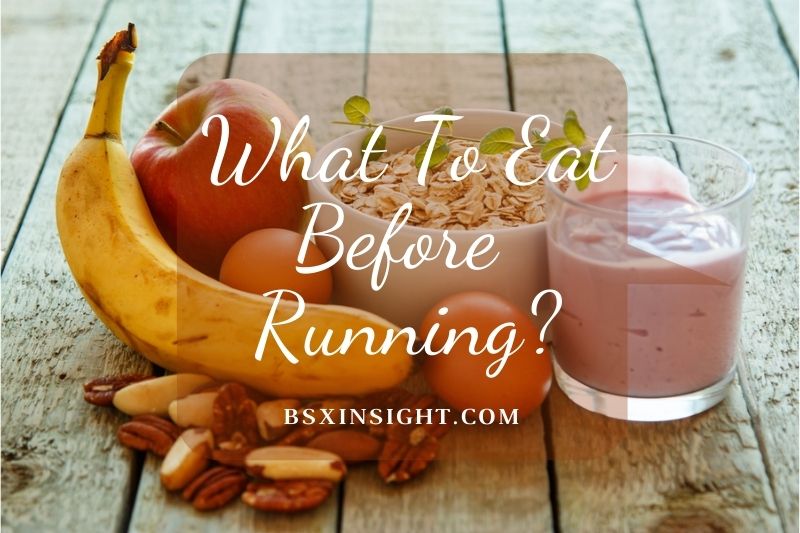- BSX Insight
It is essential to eat correctly before running to have enough energy and avoid stomach issues. What to eat before running depends on how long you plan to run and what you plan to eat afterward. Here are some tips on which you can learn information to have good health for running.
What To Eat Before Running?

Keep in mind, however, that each runner is unique. You may not find the same running tips that work for your friend. Finding the right formula for you may take some trial and error.
These are some things you can eat before you go for a run, depending on your distance and what you want to do.
Is it Better To Run On An Empty Stomach?
There is no definitive answer for how to fuel your body during a run that falls in the 60 to 90-minute range. Some runners may find that they perform just fine on an empty stomach, while others may start to feel hungry halfway through and prefer a pre-run snack. Ultimately, it’s important to experiment and figure out what works best for you.
The level of intensity of your workout or run is another factor to consider. If you’re going for a lower-intensity 90-minute run, the meal you ate a couple of hours ago might be enough to carry you through. However, if that same 90-minute run will include some intense hill repeats or tempo repeats, then some simple carbs beforehand might be a good idea to maintain your energy level. A banana, some dates, or a smoothie are some great ideas for you in that case. If you’re running soon after waking up, try putting some peanut butter on that banana for some extra calories and staying power. You’ve got a great pre-run snack if you add a small handful of almonds to the dates.
What to Avoid Eating Before Running a Mile or 5K
Before going on short or intense runs, eat as little as possible. Your fueling strategy for a shorter training session is straightforward if you lace up. You won’t need much food to get started, even if you have a few intervals or a quick run.
Your body will have enough energy to do the workout for less than an hour. Where does the energy come from? In this instance, glycogen is your primary fuel source. Glycogen is a store of sugar or glucose found in your liver and muscles. Your body uses this energy to power your exercise routine.
Running requires adequate glycogen stores. This is why runners need to eat high-quality complex carbs daily. We don’t recommend eating a lot of French bread or pasta. To keep your muscles energized, you should eat oats, quinoa, vegetables, and fruits.
You can rely on your meals from the previous day and what you ate for breakfast and lunch to replenish glycogen.
If you are running first in the morning and want to feel full, then a banana or a few yogurt pieces might be a good option. You won’t feel full or heavy, but you will be able to keep your stomach from growing while you warm up.
Also read: How Many Calories Do You Burn Running A Mile 2023?
Before Running in The Morning

You might feel a bit hungry after a quick morning run, but you can eat something to fill you up.
Light and high GI will help you digest it quickly and not feel like a rock.
Before Running a Half-Marathon
Try different recipes to find the best for medium-length runs.
You’re in a grey area for runs that last 60-90 minutes. This is where the “one-size fits all” mentality doesn’t work. Some runners may prefer to go out with a full stomach. Some runners are more likely to feel hungry halfway through their run and opt for a pre-run snack.
Another consideration is the intensity of your workout or run. You might find that the 90-minute run you are going for is less intense than the one you did a few hours ago. In this case, your last meal may be sufficient to sustain you. Simple carbs might be a good idea to maintain your energy levels if the same 90-minute run includes some hill repeats or tempo repeats.
You can make a smoothie, a banana, or some dates to go with it. Peanut butter can be added to a banana if you run quickly after getting up. A few almonds and dates can be added to make a delicious pre-run snack.
Before Running a Marathon: Pre-run meal

If you’re looking to fuel up before a run, a nutritionist says you should aim for around 300 to 400 calories, consumed about two hours beforehand. Even if you’re planning a longer run, it’s better to fuel up mid-run than to load up too much at the start. If you’ve eaten a larger meal, you may need to wait up to four hours before running to prevent stomach discomfort, although 30 minutes is usually enough after a light snack. Here are some things to eat before you go on a long run.
There are many options available for runners to fuel their runs before starting. You’ll want to eat something before you begin any run that exceeds 90 minutes. The time you leave will influence your decision.
2 hours before the run: Avocado toast, granola, and oatmeal are all excellent options.
1 hour before the run: An energy bar or something similar should be consumed one hour before starting your run. To ensure you are properly hydrated, add 8-12 ounces to a sports drink that contains electrolytes.
30 minutes or less before your run: Stick to simple sugars. My favorites are applesauce, bananas, and dates. This can be an ideal pre-run meal boost if you have a favorite energy chew.
You’ll need to eat before and during your run. Remember the glycogen stores that we mentioned earlier? These won’t last you for the entire run, especially if it’s more than an hour. You will need to eat more calories during your run. To avoid hitting “the Wall”
The rule of thumb is to consume 30-90 grams of carbohydrates per hour, depending on your effort. You can eat fewer carbs if you keep the pace and intensity low during long runs. You might be on the higher end of your route, which involves steep climbs or pushing the pace.
The bottom line: Look for foods that are easy to digest. Avoid high-fiber or fatty foods. They can sit in your stomach for longer and are harder to digest. You want to eat a snack with a mix of simple and complex carbohydrates and some protein to make you feel fuller.
There are many options; what’s a runner eat before long-distance running?
Experiment!
For long-distance runs, some runners prefer real food. Peanut butter pretzels and granola bars are all good options. Others prefer easy-to-digest calories like energy gels, chews, or sports drinks. The best thing for you is what works well in your stomach.
There will be days when your bag of pretzels is just not enough, and you reach for the gel packet. Knowing what you can use as a backup for the rest of your nutrition strategy is essential.
Running After Eating
You should wait two hours after eating a large meal before you run. This is especially true if you eat foods that take a while to digest (such as greasy, fatty, or fried foods).
It would help if you allowed yourself to eat smaller meals. It all depends on what you choose.
Eating After Running
Your goals often dictate what you eat after a run. If you’re trying to lose weight or build muscle, you might choose lower-calorie options. You will need to replenish fluids, rebuild muscle fibers, and restore glycogen levels.
Light meals or snacks that contain fluids, carbohydrates, and protein are good post-run options. Energy bars are an excellent option for those who don’t have the time to cook a meal. They can be as low in carbs and high in protein. Here are some examples of foods you might like to eat:
- Bagel with nut butter
- A protein shake
- Greek yogurt mixed with a piece of fruit
Don’t forget about replenishing your fluids with water, chocolate milk, or other recovery drinks. One study in the International Society of Sports Nutrition Journal found that chocolate milk is better than sports drinks for exercise recovery.
Avoid greasy, fried, or high-fat foods. They are high in calories but low in nutrition. Although you might feel hungry, consuming high-calorie fast food could cause your body to lose all its benefits. Sugary sodas can also be a wrong choice.
Related Articles:
What Are Good Snacks To Eat Before A Run?

Pre-Run Meal
If you’re a distance runner, you should eat something three to four hours in advance.
Events like the 10-kilometer (6.2 miles), half-marathon (21 km or 13.1 miles), and marathon are all part of distance running (42 km or 26.2 miles).
A pre-run meal is less crucial if your run is shorter than 60 to 90 minutes.
The pre-run food accomplishes two things. The first is to prevent you from feeling hungry before and throughout your run, and the second is to keep your blood sugar levels at their ideal range for your working muscles.
The meal should be high in carbohydrates, moderate in protein, and low in substances, primarily fat and fiber, that slow down digestion.
To make sure you’re fully hydrated, be sure to consume 17 to 20 ounces (500 to 590 ml) of water with your pre-run meal.
Here are a few illustrations of pre-run meals:
- One entire egg and five scrambled egg whites served with two slices of white toast, jelly, and a banana.
- One slice of white toast with one tablespoon of honey, one cup (225 grams) of low-fat cottage cheese, and one cup (150 grams) of blueberries.
- 30 grapes and one medium-sized white bagel with two slices of deli turkey and optional mustard.
- 3 ounces (85 grams) of grilled chicken breast and a dinner roll, along with one medium-sized baked potato with sour cream.
- Three ounces (85 grams) of chicken breast, one slice of gently buttered bread, one cup (200 grams) of cooked pasta, and half a cup (130 grams) of marinara sauce.
Avoid these foods:
- Dishes made with lots of butter or oil, fried foods, heavy sauces and creams, and other high-fat foods.
- Foods high in fiber include beans, cruciferous vegetables like broccoli and cauliflower, whole grains, and cruciferous veggies.
Pre-Run Food
Your body gets rapid fuel from a pre-run snack if you eat it 30 to 60 minutes beforehand.
You should only eat a pre-run snack if you plan to run for more than 60 minutes, but it’s acceptable to do so regardless of how long you plan to run.
Regulating hunger and ensuring ideal blood sugar levels accomplish the same goal as a pre-run meal.
A pre-run snack is substantially lower in calories than a pre-run meal and mostly comprises carbohydrates.
Keep the snack small because exercising while full might cause indigestion, nausea, and vomiting.
Examples of pre-run snacks are:
- A piece of fruit, such as an orange or banana
- One-half of a sports bar
- A half-english muffin with jam or honey
- 15 crackers, such as pretzels or saltines
- Dry cereal in a half-cup
- Drink 5-10 ounces (150-295 ml) of water in addition to your pre-run food to stay hydrated.
Limit the same items, such as those high in fat and fiber, that you would consume at a pre-run meal.
Additionally, if you are unsure of your tolerance for dairy products, you might want to stay away from them. Milk is used to make dairy products, which also include the sugar lactose.
Some people may experience stomach discomfort from consuming too much lactose, such as bloating, gas, or diarrhea.
Foods containing milk, cheese, butter, or cream are high in lactose. Another dairy product is yogurt, although it is usually tolerated better due to its lower lactose content.
During-Run Snack
After a run, your glycogen reserves might be drained in one to two hours. Your body uses glycogen, which is glucose or blood sugar that has been stored when it needs more energy.
For runs longer than 90 minutes, it is advised to consume 30-60 grams of carbohydrates every hour spaced 15-20 minutes apart in order to refuel and prevent weariness.
An intra-run treatment could consist of the following:
- Sports drinks: These beverages have a high carbohydrate content to replenish energy along with the electrolytes you lose through sweat.
- Energy gels: These concentrated carbohydrate sources include sugar as well as additional components like electrolytes or caffeine. They arrive in little, single-use, throw-away packages.
- Energy bars: These are frequently strong in carbohydrates and low in protein. Your muscles can renew and recover thanks to protein.
- Other snacks: Dried fruit, honey packets, gummy bears, and other candies restore energy just as effectively as their more expensive counterparts.
Whatever intra-run food you choose, be sure it can be transported with you on your run or will be accessible to you throughout a race.
Depending on how much you perspire, you’ll also want to hydrate yourself with water throughout the race. Drink 17 to 34 ounces (500 to 1,000 ml) of water every hour to do this.
But be careful not to drink too much water. If you have 8 ounces (240 ml) of a sports drink in an hour, avoid consuming an additional 17 to 34 ounces (500 to 1,000 ml) of water.
Nutrition Prior to and During a Run Is Trial and Error
Make sure to experiment to find the ideal fuel for you when it comes to running.
For instance, you could discover that white rice is more palatable for your pre-run meal than a baked potato.
Or you might discover that while eating an apple gives you stomach problems during your run, a banana did not.
The greatest time to try new foods and see what works for you is during training runs (10Trusted Source).
Never do anything new during a race that you haven’t done throughout training since you never know how your body will respond to a change.
What Are Good Snacks To Eat During A Run?
You’ll only need water or a sports beverage for runs of less than an hour.
You will need to consume a form of carbohydrate for any run that lasts more than 75 minutes or for runs lasting over an hour.
You can experiment to discover what works best for your long-term goals.
On runs that last more than an hour, runners might consume half an energy gel, two energy chews, or a handful of energy beans every 30 seconds. These should be accompanied by plenty of fluids.
Running Without Cramps
Running can be affected by dehydration. This includes cramps, bloating, and stomachaches.
Drink water or a sports drink every 15-30 minutes while running. Avoid high-fiber foods the night before and on the day of your run to prevent cramps. They can cause cramping or GI problems.
How To Avoid Nausea When Running?
After a hard workout, you may feel nauseous or dizzy. There are many reasons why runners may experience nausea, such as:
- Dehydration
- slowed digestion
- Heatstroke
Drink plenty of fluids, especially during hot days, to avoid nausea when running. It would be best if you also cooled down properly after running to allow your body to adjust.
A small snack can help prevent nausea by eating 30 minutes or less before you run.
What Not to Eat Before You Run Any Distance?
There are many great suggestions for what you should eat before running and similar recommendations for what not to eat.
Salsa burps are a great way to spice up spicy foods. For your post-run meal, save the hot sauce!
High-fat foods are harder to digest and more likely to stay in your stomach, causing a heavy feeling and resulting in an unpleasant sensation on the run. (Heavy sauces and creams, fried foods, or foods prepared with a lot of butter or oil.)
High-fiber foods are not a good idea now. You might regret it halfway through your run.
Do Not Wait Until Race Day To Learn The Wat To Eat Before Running?
The most important rule for race day is not to try anything new. This applies to new clothes and shoes as well as food and nutrition. You’ll know what works for your body by race day. You can choose to eat a full meal before you start a run, or you prefer to eat something beforehand. Do you know what the best answer is for you?
Your race should be in the same category as the one above. A 5k race can be considered a shorter run. On the other hand, a half-marathon will take 2+ hours and fall under the long-run category. It would be best if you ate early enough to ensure your digestive system isn’t stressed with a full belly before your race starts. This is just like what you did on your training runs.
Bonus Tips
Hydrate!
Hydration is crucial for all runners, regardless of how long your training runs are, no matter how long they may be. You’ll find yourself in a challenging (pun intended) position if you don’t hydrate before you begin your run. During the run, it’s a constant battle. It’s better to stay hydrated before you put on your shoes.
It is easy to remember to drink at least 4-6 glasses of fluids before noon and 4-6 glasses afterward.
What to Eat Before Weight Training?
A few things to consider when deciding what to eat before weight training. First, you need to consider how long before your workout you will be eating. Second, you must choose foods high in protein and complex carbohydrates. Third, you need to make sure you are hydrated. If you are eating within an hour of your workout, you should focus on simple carbohydrates like fruit or a sports drink. Eating more than an hour before your workout, you should focus on complex carbohydrates like oatmeal or whole-grain toast. Either way, you should make sure you are drinking plenty of water.
FAQs
What should you not eat before running?
If you want to eat fruits or vegetables before runs, zucchini, tomatoes, olives, grapes, and grapefruit are low in fiber
What to eat before running a half marathon?
Before a marathon, you’re looking at something between 50 and 75 grams. For runs longer than 75 minutes, you’ll also need to think about bringing along some mid-run fuel, because your glycogen stores will be depleted.
What to eat before running in the morning
“This is especially important if you had an early or low-carb dinner (think BBQ or sushi) the night before a morning run.
Many people may wake up and not feel hungry, so they don’t eat anything before heading out, but then they bonk in the middle of their run… you do need some fuel to burn while you’re running.”
What to eat before a run to lose weight?
Soy, rice, and almond milk are generally safe because they don’t contain lactose, which can be tough to digest.
Conclusion
Before running, eating something that will give you energy and help you avoid cramps is essential. Carbohydrates are a good choice, as are sports drinks or fruit. Be sure to avoid fatty or sugary foods, which can slow you down.

